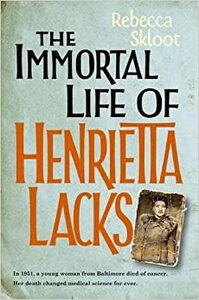You need to sign in or sign up before continuing.
Take a photo of a barcode or cover
I thought this book was super fascinating. After reading it I went right to the henrietta lacks foundation website to see what has happened with the family. It raises some very interesting ethics of cellular ownership...
I would have liked more about the science and how the cells are used. This area of the book felt basic. The parts about Henrietta’s life and her family were interesting but I felt the family’s problems were more due to poverty and racism than actually due to the use of the cells. The afterword about the legalities of tissue use was excellent but seemed divorced from the rest of the book. A worthwhile read but disappointing at the same time as I didn’t feel the book had an aim and it was therefore very disjointed.
Okay, first just the narration: the narrator does "accents." It didn't bother me when she was doing all these African-American people, but when she busted out the Asian-American "ah so" thing, I was sort of horrified. Does that make me a racist? I'm not sure. Anyway, she was fine with everything else.
I originally gave this three stars but busted it down to two (that means "It was OK.") It's not a bad book, per se, I'm just a little bewildered at how successful it apparently was. There are two parts, intertwined: there's the part about how the HeLa cells affected scientific research, and some things that came out of it. Then there is the story of the family of the woman from whom the HeLa cells were taken.
The science part is . . . interesting, but not fascinating. Like, it's okay, and I'm glad I read it. It was magazine-article interesting.
The Lacks family part . . . it's only sort of interesting as well. Poor black family from the south, and some of the members of the later generations clearly have mental issues. (Which may or may not be related to the fact that cousins married cousins. I thought it was determined that cousin-on-cousin love is actually not that big a deal? No? I was not as appalled as I apparently was supposed to be.) Hardworking mother who has a jillion kids! Dad who drinks and slaps the wife around! Molesting uncle! It's like a Toni Morrison novel without the poetry.
I don't mean to make light of their situation -- it's compelling to them, and to the author, who came to be so personally embroiled in their lives. But narratively speaking, I don't think their story is actually too interesting. And when you come down to it, their troubles had NOTHING to do with the HeLa cells. Nothing whatsoever. They thought they were -- because they're ignorant and uneducated (I don't intend either of those descriptors to be insulting, it's not actually their fault that they are uneducated and ignorant,) and because they have been screwed by the system in general, being poor and black. But whether or not their mother's cancer cells had turned out to be immortal, their lives would not have been different.
Lacks's sons are convinced that they are owed money because of these cells, but the original researcher charged nothing for their distribution; he was just super-hyped that he had found these things. Later, other labs produced HeLa cells on a massive scale, and you can purchase them for research -- but is the Lacks family entitled to any of that profit? The author doesn't seem to think so, as sympathetic as she is to the family, because she didn't try to convince me. So, sorry, guys. I do think that you are entitled to health care, but that has nothing to do with the fact that your mother changed scientific research as we know it; it has to do with the fact that you are human beings.
One last thought, and that's regarding the mental issues I mentioned above -- clearly, Deborah and Zakariyya [oh man, I wanted to KILL the narrator for pronouncing it "za-KAH-ree-yah" until it was explained, 3/4 of the way through, that that's the way he pronounces it] [she did keep pronouncing in situ incorrectly, though, as far as I know, and that made drove me crazy as well] are mentally ill to some degree, and whenever that was made clear, it made me feel . . . uncomfortable. As though they were being exploited for their entertainment value. The author tries to treat them with respect, and I'm not sure what she should have done differently, I just . . . I dunno. It made me feel dirty.
Anyway. There you have it. I didn't NOT like it, I just didn't see what all the fuss was about.
I originally gave this three stars but busted it down to two (that means "It was OK.") It's not a bad book, per se, I'm just a little bewildered at how successful it apparently was. There are two parts, intertwined: there's the part about how the HeLa cells affected scientific research, and some things that came out of it. Then there is the story of the family of the woman from whom the HeLa cells were taken.
The science part is . . . interesting, but not fascinating. Like, it's okay, and I'm glad I read it. It was magazine-article interesting.
The Lacks family part . . . it's only sort of interesting as well. Poor black family from the south, and some of the members of the later generations clearly have mental issues. (Which may or may not be related to the fact that cousins married cousins. I thought it was determined that cousin-on-cousin love is actually not that big a deal? No? I was not as appalled as I apparently was supposed to be.) Hardworking mother who has a jillion kids! Dad who drinks and slaps the wife around! Molesting uncle! It's like a Toni Morrison novel without the poetry.
I don't mean to make light of their situation -- it's compelling to them, and to the author, who came to be so personally embroiled in their lives. But narratively speaking, I don't think their story is actually too interesting. And when you come down to it, their troubles had NOTHING to do with the HeLa cells. Nothing whatsoever. They thought they were -- because they're ignorant and uneducated (I don't intend either of those descriptors to be insulting, it's not actually their fault that they are uneducated and ignorant,) and because they have been screwed by the system in general, being poor and black. But whether or not their mother's cancer cells had turned out to be immortal, their lives would not have been different.
Lacks's sons are convinced that they are owed money because of these cells, but the original researcher charged nothing for their distribution; he was just super-hyped that he had found these things. Later, other labs produced HeLa cells on a massive scale, and you can purchase them for research -- but is the Lacks family entitled to any of that profit? The author doesn't seem to think so, as sympathetic as she is to the family, because she didn't try to convince me. So, sorry, guys. I do think that you are entitled to health care, but that has nothing to do with the fact that your mother changed scientific research as we know it; it has to do with the fact that you are human beings.
One last thought, and that's regarding the mental issues I mentioned above -- clearly, Deborah and Zakariyya [oh man, I wanted to KILL the narrator for pronouncing it "za-KAH-ree-yah" until it was explained, 3/4 of the way through, that that's the way he pronounces it] [she did keep pronouncing in situ incorrectly, though, as far as I know, and that made drove me crazy as well] are mentally ill to some degree, and whenever that was made clear, it made me feel . . . uncomfortable. As though they were being exploited for their entertainment value. The author tries to treat them with respect, and I'm not sure what she should have done differently, I just . . . I dunno. It made me feel dirty.
Anyway. There you have it. I didn't NOT like it, I just didn't see what all the fuss was about.
3.5 ⭐️ rounded up - an important account of the remarkable history of HeLa cells and Henrietta Lacks. An informative read whose narrative prose falls a little short but makes up for it in the true impact that this true story has had on our world today. Interested in seeing the film adaptation!
3.5 stars. This is an important story and I'm glad its been told. Henrietta Lacks deserves recognition for her important contribution to science (through the nonconsensual "donation" of her HeLa cells). The author inserts herself into most of the story, which sometimes feels bogged down by her own tribulations and detailed descriptions of her interactions with the Lacks family. However, I feel she was intending to respond to the family's simple desire to not be overlooked or be used, and for Henrietta to be appropriately recognized.
I was so surprised by this book. I was expecting a popular science book but got so much more. Skloot unfolds the story of Henrietta Lacks and her immortal life so beautifully, carefully, and craftily. I was so compelled to continue on the journey and couldn't put the book down. I don't remember what drew me to this book, but I am so glad I was!!
I wouldn't go so far as to say that this book read like a novel, as some have said, but it did manage to combine science and human interest very effectively.
I loved Deborah, she is so refreshingly real. I loved it whenever anyone reached out to the Lacks family and tried to help them understand the difficult concepts surrounding their mother's cells and the scientific research and discoveries they facilitated.
I had no idea there were so many controversial issues regarding human tissue research.
I loved Deborah, she is so refreshingly real. I loved it whenever anyone reached out to the Lacks family and tried to help them understand the difficult concepts surrounding their mother's cells and the scientific research and discoveries they facilitated.
I had no idea there were so many controversial issues regarding human tissue research.
informative
medium-paced





